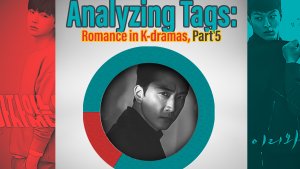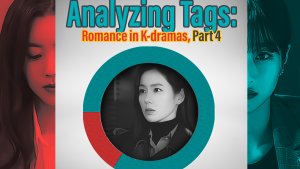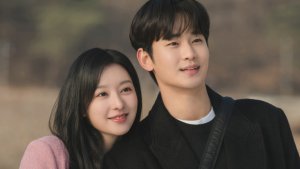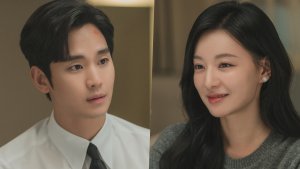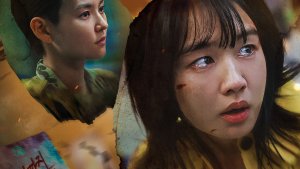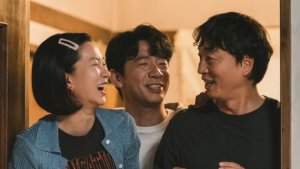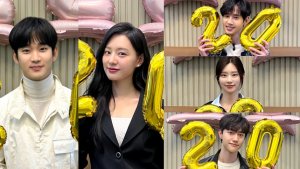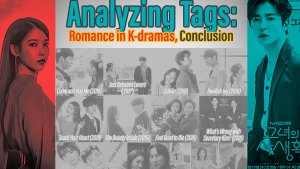 A Tag Analysis: Romance in K-Dramas - Conclusion
A Tag Analysis: Romance in K-Dramas - Conclusion
I've been tempted to write an article for a while and this one seemed like a good start. More so considering how low-key this drama has remained despite its interesting plot, lovable cast, and sophisticated visuals. Let's start by sharing a more detailed synopsis. I'll do my best to avoid spoilers as much as possible.

Lee Da Il (ML) & Han Sang Sub (ML's sidekick) are co-owners of a small detective inquiry agency called "A Few Good Men". Despite its charming name, business hasn't been doing so great. That is until a big client promises to turn their lives around.
Contrary to his brooding exterior, Da Il is a soft-hearted man with a penchant for justice. By taking the kidnapping case, he catches the attention of Jung Yeo Wool (FL), who offers her services as a resourceful part-timer. It doesn't take long for Da Il and Yeo Wool to bond. After all, they both share the pain of losing someone to suicide and becoming, by all intents and purposes, orphans.
But what starts as a kidnapping case is about to lead them down a rabbit hole, where a bigger menace lays in wait. A psychopath has bound them together, but will that be enough to stop her? And if so... at what cost?

If the synopsis hasn't convinced you, then here are five reasons why you might want to give this drama a chance. I'll add some flaws to consider to paint a better picture of the good and the bad this drama has to offer. For those who don't want spoilers, I'll hide additional information that may give away key plot-points.

If you like crime with a twist of supernatural, then you'll certainly enjoy this drama. The story may not be free of plot-holes or keep its interesting pace throughout (as is the norm with many dramas), but the good does outweigh the bad.
However, it's important to keep in mind that the crime aspect gets swallowed up by the supernatural plot halfway through. Which means that stopping the killer involves less "detective/police skills" and more... well, shaman magic (sort of).

I won't go into detail about the cast. Suffice to say, they did a great job in their roles. Their motivations for joining the crusade against the antagonist were clear and coherent. And despite their different personalities, they worked well together and were even held accountable for their actions (a bonus in my books).
Yet, although some members contributed to the story in important ways, others intervened only when it was convenient to the plot, so we didn't get to know them much. On the one hand, the ending provided some semblance of character growth for all the support characters. On the other, by ignoring said characters, the story was able to focus more on our main protagonists and their individual conflicts.
The ending tied all the loose ends and, as a result, was as satisfying as possible. However, rather than solve the entire drama, we got an open ending that could pave way for a second season. So, even if the plot lost steam towards the end, I still enjoyed the story and would probably re-watch the drama. And if there's indeed a second season, I'll most certainly watch it as well.
╮("╯_╰)╭ Flaws to consider ╮(╯_╰")╭
- The writing weakened when it came to resolving the main conflict, so the end wasn't as strong as the start. In fact, important events were rushed and poorly handled towards the end, causing them to lose impact.
- Crucial explanations fell short and one, in particular, didn't make a lot of sense. I'll add the two biggest ones below (major spoilers):
- If the characters only needed to be scared to be able to see Da Il's ghost form, then wouldn't they have done so sooner? Detective Park was pretty creeped out when Da Il barged into his interrogation session. And Mr. Han and the Reporter would've been scared when Da Il started throwing "hypnotized" people around. Another strange thing is that once the lawyer saw him, everyone else was able to see him as well without having to be scared. If this point was explained, I missed it entirely.
- Another disappointing thing was how easily Yeo Wool got possessed and overpowered by Woo Hye. After all, the shaman emphasized how Yi Rang (Yeo Wool's sister) had very strong spiritual energy, which transformed some of her belongings into protective charms of sorts. Yet, Yeo Wool couldn't fight against Woo Hye despite having three of Yi Rang's belongings with her (the knife, the necklace, and the hearing aid).
- Though the build-up to assemble their team was entertaining, they failed to make use of their members and, in the end, sidelined them when it mattered. Additionally, some of them even had interesting backstories that I wished were further developed, so those felt like lost opportunities.
- As is common in drama-land, you can expect our protagonists to make some pretty BIG mistakes when it comes to dealing with Woo Hye, which shows a lack of common sense.
- Woo Hye's main minion (her caretaker) wasn't developed, which made his motivation come across as vague and convenient.
- The end left me with a feeling of "...to be continued" which may not be as satisfying for some. Think about it as a pilot for a second season, instead of a proper end of the first season.
 LEE DA IL | Male Protagonist | Played by Choi Daniels
LEE DA IL | Male Protagonist | Played by Choi Daniels
 I've only seen Choi Daniels in "Jugglers" before and he didn't leave much of an impression. Fortunately, that's not the case this time around. Let's just say dark, tall and sexy fits him like a glove. Add to that a gentle soul, and you get a killer combination of a rebel with a heart of gold.
I've only seen Choi Daniels in "Jugglers" before and he didn't leave much of an impression. Fortunately, that's not the case this time around. Let's just say dark, tall and sexy fits him like a glove. Add to that a gentle soul, and you get a killer combination of a rebel with a heart of gold.
But if you think he's as perfect as he looks, then you've got another thing coming. Da Il is indeed smart, skilful and capable at his job, but he's balanced out with believable flaws. He suffers, makes mistakes, pays the consequences and always strives to do better. He's also mature enough to accept when he needs help and knows - for the most part - how to be a team player.
But where he truly shines is in the subtlety of his acting. He's able to show a vast array of emotion through sheer body language and micro-expressions. This guy can tear your heart to pieces or steal your breath away with a single glance.

╮("╯_╰)╭ Flaws to consider ╮(╯_╰")╭
- Although he starts out as a team player and remains so for the most part, drama-land demands that when it matters, he makes the bad decision of striking solo. Which forces the rest of the characters to waste time trying to catch up to him rather than deal with the antagonist.
- Although his gazes and smiles are to die for, sometimes the moments are drawn out, turning his acting a bit theatrical.
- Some of his decisions are questionable at best and nonsensical at worst. Let's just say the noble sacrifice trope is strong with this one.
- Although he is consistent, Da Il doesn't get much (if any) character growth.
JUNG YEO WOOL | Female Protagonist | Played by Park Eun Bin
 Talk about a strong, capable, kind and active protagonist! Yeo Wool is nothing short of admirable and Park Eun Bin does a great job at portraying emotions in a believable way. I'm especially grateful that her character didn't turn passive when Da Il (and others) tried to sideline her.
Talk about a strong, capable, kind and active protagonist! Yeo Wool is nothing short of admirable and Park Eun Bin does a great job at portraying emotions in a believable way. I'm especially grateful that her character didn't turn passive when Da Il (and others) tried to sideline her.
By actively pursuing ways to help, Yeo Wool didn't become a cheerleader for our male protagonist (a fate many Female Leads succumb to and one of my biggest pet peeves). Instead, she remained focused on not only stopping the psycho threatening them, but also ensuring Da Il's anger didn't lead him astray. In a way, she takes the role of moral guide and guardian of their partnership.
Unlike Da Il, she's not shy about voicing her emotions out loud. She's honest about how she feels from the get-go, but never becomes a puppy at his heels. Even if she does fret and worry about him (and for good reason), she never loses focus on what needs to be done. The fact that saving someone takes precedence over getting revenge just makes her contribution more respectable.


╮("╯_╰)╭ Flaws to consider ╮(╯_╰")╭
- Though she's always actively involved in the plot, Da Il does try to sideline her on more than one occasion. Which means, she's left trying to catch up to him.
- Though she introduced herself to Da Il by listing a lot of skills, she used less than half throughout the drama (and some where conveniently forgotten when it mattered).
- Yeo Wool doesn't always think things through, which means she sometimes needs saving whenever she tries to accomplish something on her own. Though, frankly speaking, she's not the only one who gets rescued, so she never feels like a damsel in distress.
- Like Da Il, some of her decisions are questionable.
- She remains consistent, but also gets very little character growth.
HAN SANG SUB | Lovable Sidekick | Played by Kim Won Hae
 I swear the easiest way to get an audience to care for a character is to cast Kim Won Hae in any role. Without a doubt, his character is the heart of "A Few Good Men" and the glue that keeps the ragtag team together. He also helps lift the mood with well-timed and executed comic relief.
I swear the easiest way to get an audience to care for a character is to cast Kim Won Hae in any role. Without a doubt, his character is the heart of "A Few Good Men" and the glue that keeps the ragtag team together. He also helps lift the mood with well-timed and executed comic relief.
He's as capable as he is hilarious, so there's never a dull moment when he's around.
Regardless of what you feel about the drama, I can promise you that Han Sang Sub is a character that'll make you smile - if not laugh out loud.


╮("╯_╰)╭ Flaws to consider ╮(╯_╰")╭
- Kim Won Hae's skills falter towards the end. Moments that should elicit tears or make you feel bad just come across as theatrical. It doesn't help that he stopped crying and only scrunched up his face.
- He becomes more and more irrelevant as the story progresses, turning him into a "gentleman in distress".

SEON WOO HYE | Main Antagonist | Played by Lee Ji Ah
 Rather than throw at us a psychopathic serial killer that hurts people as a form of entertainment, we get Seon Woo Hye. She's a creepy, supernatural, power-infused killer who's trying to prove a point of forcing people into a difficult (albeit thought-provoking) moral dilemma:
Rather than throw at us a psychopathic serial killer that hurts people as a form of entertainment, we get Seon Woo Hye. She's a creepy, supernatural, power-infused killer who's trying to prove a point of forcing people into a difficult (albeit thought-provoking) moral dilemma:
Would you die as a human or live as a monster?
Her motivations for killing reminded me of the "Trolley Dilemma" developed by philosopher Philippa Foot in 1967. By creating a clever scenario, Phillipa forced people to consider whether an action's moral value is determined by its outcome.
The trolley dilemma goes like this:
Imagine a trolley is moving toward five people lying incapacitated on the tracks. A lever beside you would redirect the trolley onto a side track where only one person is laying. Would you sacrifice one person to save five?


Of course, Seon Woo Hye goes one step further by adding an emotional component. Would you kill a loved one to save a crowd, for example? And if you don't... are you still responsible for the crowd of people dying? If faced with such a decision... would any of us be able to choose?
This type of moral dilemma is woven into the story, tying every character together. The interesting part is that, if you pay attention to the main characters' actions, you'll realize that they're already answering the dilemma without realizing. And that answer might surprise you.
╮("╯_╰)╭ Flaws to consider ╮(╯_╰")╭
- Seon Woo Hye's powers - and what her limitations are - never get a proper explanation.
- There's some vagueness to her character that comes across as an inability to decide whether she's a psychopath (who can't feel emotions) or a sociopath (who can't feel empathy but is capable of emotions).
- Though she's established a pattern for killing, she makes one unexplained exception. Why did Yeo Wool's younger sister, Yi Rang, gets the "kill yourself or I'll kill your sister" choice? Yi Rang should've died without getting a moral dilemma, since, by that point, Gyeol had chosen to live at the cost of her life. And if an exception could be made, then why didn't we see anyone else getting the chance to save themselves at the cost of another person's life?
- The story loses steam in the second half, progressing into an anticlimactic end for our villain.

Yes, there's romance despite the show not being tagged as such. But it's important to understand that this isn't your typical "k-drama romance". You won't have a "date scenario" (though there is a subtle one later on) or a subplot of petty jealousy driving our protagonists into each other's arms... and I, for once, appreciate that.
I love that there's a story outside their relationship, which means the romance is weaved into the drama in a very sophisticated and unobtrusive way. Yet the way the two characters are drawn to each other still feels very organic and heartfelt, perhaps even more so than your typical romance-centric story.
As much as I enjoy a happy romance, I have a soft spot for a slow-burn courtship with a hint of darkness and the threat of possible heartache looming over every scene. The Ghost Detective builds said romance through soft, subtle scenes. A small smile, a stolen glance, a gentle caress...

This show's romance dwells in the yearning for each other, resulting in electrifying tension whenever our two protagonists share a scene. And, of course, we do get some payoffs which culminate on a few big, romantic gestures (played in slow-mo and from multiple angles).

It's also important to note and give credit to how balanced their relationship is portrayed. There's a give-and-take exchange, so it never feels like one of them has the upper hand or is chasing the other around. Instead, these are two souls who've been drifting aimlessly until they found an anchor in each other. It's clear from the get-go Da Il and Yeo Wool are a power couple in the making.
╮("╯_╰)╭ Flaws to consider ╮(╯_╰")╭
- The romance is low key. As such, their relationship does take a back seat to the main story. So if you're hoping for many big romantic gestures, you'll probably feel unfulfilled.
- Though there's a second male lead pining for Yeo Wool, he doesn't stand a chance against Da Il, partly because he isn't as fleshed out. This also makes his love for Yeo Wool to feel a bit distracting.
- Rather than work together towards their common goal, at some point, both characters compete for the right of becoming... the final martyr.
- If you're hoping for a kiss, there won't be one (it was disappointing for me as well).

This show is poetry in motion. The attention to detail in each scene means great insight can be obtained not only through dialogue, but also from the set, the lights, the colors, the framing, the music and the camera's movement.


As an example of the director's exquisite craftsmanship, let's deconstruct one scene of the drama. I'll do my best to keep things vague while still offering crucial context. The following scene will show our protagonists' mental and emotional states through framing and actions. As a bonus, it also incorporates accountability. Meaning, our male lead must pay for his actions regardless of his intentions.
I've edited the shot so we can focus on the play of reaction (instinct) vs choice (rationalization):

In the first snippet, we get a tense reunion between Da Il and Yeon Wool after an event which has strained their relationship. Their instinctive reactions kick in: Da Il steps forward, wanting to make sure she's okay. But that causes Yeon Wool to step back in evident fear and hesitation.


We then get a short conversation, and now the scene moves into conscious action. Yeon Wool steps forward, wanting to reassure him that they're still a team. But Da Il steps back, unable to trust himself and risk her safety.
The two scenes act as a mirror of events, and when seen together, the flow is quite marvelous. But let's go one step further and deconstruct the setup:


Notice how Da Il is in the shadows and Yeo Wool isn't. There's a clear line (literally and metaphorically) dividing them, which is further supported by their conversation and actions. Da Il was about to step "into the light" but never actually leaves "the shadows".
Every line in the composition helps us focus on the characters. And to either side of them, we find a set of stairs acting like a frame. Those stairs lead to the same place but, like our characters, only one is in shadows. Besides creating symmetry, the stairs symbolize that their goals are still aligned and that, as such, they are heading in the same direction but through different paths. Which foreshadows that they'll meet again.
After their exchange, we also see Da Il turn his back on Yeon Wool (and therefore the "light") and dive further into the shadows. Consistent with her character, rather than follow him, Yeon Wool remains in the "light". This play of dark vs light (corruption vs purity) is a theme the show uses over and over with great success. It's no coincidence that Yeon Wool always wears light-colored clothing while Da Il sports darker clothing. Neither is it accidental that Woo Hye would try to use light-colored clothing only for it to get stained again and again.
╮("╯_╰)╭ Flaws to consider ╮(╯_╰")╭
- The music gets very repetitive. There's one in particular that lost all impact. You know something's about to happen when you hear the "ah ah ah ah ah" song.
- As much as I like some mirroring events, it was frustrating that mistakes made by one character were subsequently made by the other - sometimes even back to back!
- Some of the visual effects were just silly.

SO WHAT DO YOU THINK ABOUT THE GHOST DETECTIVE?
DID YOU ENJOY IT?
IF THERE'S A SECOND SEASON, WOULD YOU WATCH IT?


